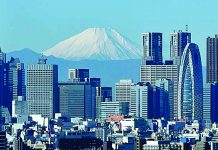Japan finds luring business from Hong Kong may be tough
TOKYO: Tokyo is on a charm offensive, hoping to lure firms in Hong Kong spooked by protests and a controversial security law imposed by China. But the city is proving a tough sell.

TOJYO: While Tokyo is capital of the world’s number-three economy and offers attractive incentives such as tax breaks, it also has a number of stumbling blocks Japan is hoping to lure businesses considering relocating from Hong Kong, but it faces some tough obstacles, and competition. – AFP
“I want to make Tokyo Asia’s number one financial city,” Governor Yuriko Koike said in October, as the Japanese capital opened an information center in Hong Kong for international businesses considering a move. Tokyo’s courtship comes with some concrete promises, including temporary office space in the city for foreign financial firms that want to try out life in Japan.
There are also a number of more theoretical incentives being floated, including tax breaks, streamlined bureaucracy and even a special economic zone like Shenzhen, China’s Silicon Valley. In some ways, Japan might seem an obvious alternative for businesses looking to leave Hong Kong: it is the world’s third-largest economy, home to the Tokyo Stock Exchange, and already houses outposts of numerous financial institutions and international firms.
Low English fluency levels are also a chronic handicap, as is the country’s comparatively sluggish adoption of digital technology. Trade on Tokyo’s stock markets was halted for an entire day last month because of a “hardware failure”-a glitch seen as unlikely to boost confidence and bring new traders flocking.
Fierce competition
Michael Mroczek, president of the European Business Council in Japan, said there were high hopes for new Prime Minister Yoshihide Suga’s digitization and deregulation push. But “there’s also a lot of skepticism because there haven’t been a lot of changes” over the years when similar initiatives have been proposed, he added. Japan’s particularly strict approach to border control during the pandemic-for months foreign residents were not allowed to return even as Japanese citizens did-has been seen by some as “discrimination” and could also be off-putting for tentative transplants, added Mroczek.
And while Singapore’s government officially says only that it seeks a “stable, calm and prosperous” Hong Kong, it is probably the most obvious alternative for firms, said Rajiv Biswas, Asia-Pacific chief economist at consultants IHS Markit. “Most international financial services firms may already have a large presence in Singapore, and therefore may prefer to expand their existing operations in Singapore rather than finding another new location,” he said.
‘Wait and see’
There are still questions, though, about whether an exodus from Hong Kong is really on the cards, whichever regional city stands to gain. “I wouldn’t expect big firms to announce that they are pulling out of Hong Kong completely,” Mark Williams, chief Asia economist at Capital Economics, told AFP. “It’s more likely that firms will just gradually reduce their headcount in Hong Kong and increase it elsewhere.” And despite jitters over freedom of expression, Hong Kong “remains the primary gateway to mainland China” for investors and financial services companies, said Stephen Innes, chief global markets strategist at AxiCorp.











